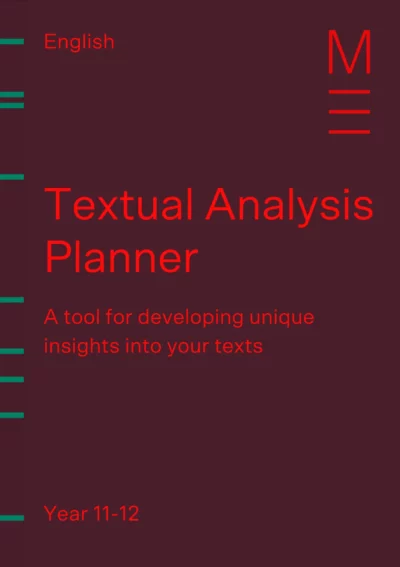Welcome to Matrix Education
To ensure we are showing you the most relevant content, please select your location below.
Select a year to see courses
Learn online or on-campus during the term or school holidays
Learn online or on-campus during the term or school holidays
Learn online or on-campus during the term or school holidays
Learn online or on-campus during the term or school holidays
Learn online or on-campus during the term or school holidays
Learn online or on-campus during the term or school holidays
Learn online or on-campus during the term or school holidays
Get HSC Trial exam ready in just a week
Get HSC exam ready in just a week
Select a year to see available courses
Science guides to help you get ahead
Science guides to help you get ahead

Unsure of what Year 11 Module B Close Study of Literature requires you to do? Well, this article to break down the Module key statements and show you what you need to do to ace Close Study of Literature.
Tailor your analysis to the Module B rubric

Level up how you analyse texts and take notes with expert strategies and templates!

Fill out your details below to get this resource emailed to you.
"*" indicates required fields
Unlike the previous syllabus, the new 2019/2019 syllabus mandates that all students must study the same Modules in Year 11. However, NESA did not prescribe any texts.
It is also compulsory for all Year 11 English Standard students to study the Common Module: Reading to Write, first. The order of study the other modules are determined by individual schools.
Module B: Critical Study of Literature is designed to be the 3rd and final Module of Year 11 English Standard.
It equips you with the English skills and knowledge to closely analyse texts and prepare you for your Year 12 Module B (which is also Close Study of Literature) .
The Year 11 Modules set for study for English Standard are:
Take a read of our Beginner’s Guide to Acing HSC English to learn more about the different skills and knowledge you need to ace HSC English.
Module B requires you to form a connection with the text and determine its value. This means that you need to:
Does it still sound confusing?
Well, pretend you’re a literary critic determining the value of a text.
Does it touch you personally? Did the compose use the best possible form, media and techniques to convey meaning?
Don’t worry if you still don’t understand, we’ll go into the rubric in detail.
Year 11 Close Study of Literature prepares you with the skills and knowledge needed to complete the Year 12 version of Close Study of Literature.
Both Year 11 and 12 Modules aim to get students feeling personally connected with texts and in a position to evaluate how and why composers create meaning in their texts.
You learn how to unpack a text and figure out how composers use different techniques and tools to communicate their message to the audience.
In Year 11, you will be focusing on how composers construct meaning and why. It’s important that you figure out why the composer chose to explore certain themes and ideas to determine the text’s value. Then how they’re using form and structure and devices to developt hose ideas for audiences.
So, let’s move on and break down the syllabus rubric.
The Year 11 Close Study of Literature rubric identifies and explains everything you need to do for Module B. These are the objectives you need to keep in mind when completing your assessment tasks.
In this module, students develop their knowledge and appreciation of a substantial literary print text. Through their close study of and personal responses to the text in its entirety, students develop an understanding of the ways that language features, text structures and stylistic choices can be used in literary texts.
Students study one literary print text, for example a prose fiction, drama or a poetry text, which may constitute a selection of poems from the work of one poet. They identify, analyse and respond to the ideas in the text and the ways in which meaning is shaped. Students examine the conventions that are particular to their chosen literary form, and the ways that authors use, manipulate and/or challenge those conventions.
Through their critical and creative responses to the text, students develop their understanding of the use and effects of elements such as style, tone and mood. They further develop their critical skills to analyse and assess the ways meaning is shaped and conveyed.
Through their engagement with the text and their own compositions, students further develop their personal connections with, and enjoyment of the text, enabling them to express their personal interpretation of its meaning and importance. They express their ideas clearly and cohesively using appropriate register, structure and modality. They plan, draft and refine their own written and spoken texts, applying the conventions of syntax, spelling and grammar appropriately for their audience, context and purpose.
To help you get ready to ace Year 11 Module B: Close Study of Literature, we’ve broken the rubric down into 8 key statements and explained them in plain English. Source: Module B Rubric from NESA website
Did you struggle to understand some of that? Don’t worry, you’re not alone. Most students struggle to understand what the rubrics ask of them.
To help you understand the Close Study of Literature rubric, we’ve broken it down into 8 key statements.
“Students develop their knowledge and appreciation of a substantial literary print text.”
The statement requires you to gain an in-depth understanding of the text.
So, unlike other Modules where you examine the context of the text, your main focus of Close Study of Literature is the text and its meaning.
In simple terms, form a connection with the text and develop your personal opinions and interpretation,
“Through their close study of and personal responses to the text in its entirety, students develop an understanding of the ways that language features, text structures and stylistic choices can be used in literary texts. They identify, analyse and respond to the ideas in the text and the ways in which meaning is shaped. “
You need to develop your own perspectives and interpretation of the text in this module.
This means that you need to consider the text as a whole, and find distinctive elements of the text that stands out to you or touches you personally. These include language features, the structure and the composer’s stylistic choices.
So, to find these elements, ask yourself:
What are the elements that makes this text different from others? Does this make it more effective at conveying an idea? Do the ideas and message personally touch you?
Remember to pay attention to how you’re feeling or what you’re thinking when you come across these elements. This will help you write a more ‘personal’ response.
“Students examine the conventions that are particular to their chosen literary form, and the ways that authors use, manipulate and/or challenge those conventions.”
The Close Study of Literature requires you to examine the construction of the text’s form.
Different forms have different conventions. For example, a convention of ‘The Hero’s Journey’ is that the hero meets a mentor, suffers a failure, and ultimately wins in the end.
When you are studying your text for Module B, you need to be able to identify the conventions of a particular text form.
Then, determine why the composer decided to follow, manipulate or challenge these conventions.
Some elements you can consider when determining the conventions of a text are:
The syllabus requires you to draw on these elements to analyse the text. Your evidence and techniques will draw on these aspects.

“Through their critical and creative responses to the text, students develop their understanding of the use and effects of elements such as style, tone and mood.”
Module B requires you to be critical about the text’s effectiveness at using style, tone and mood to convey meaning. Let’s see what each of these elements mean:
For this key statement, you need to determine how the composer uses style, tone and mood to represent different experiences, and figure out the effect on the audience. Remember, be ‘critical’. So make a judgement about the effectiveness of these elements.
“They further develop their critical skills to analyse and assess the ways meaning is shaped and conveyed.”
This Module requires you to be a ‘critic’. So, it is not enough to simply determine your own personal perspectives and interpretation.
Do some research about the context of the text and how people responded to the text in the past and in our current day. Texts tend to ‘fall in and fall out’ depending on the context. So, this will be an interesting aspect to examine as it can help you develop your judgement about the text.
Furthermore, you should discuss the text with your friends and teachers.
Learn about their perspectives and opinions and compare it with yours!
It’s quite possible that your interpretation of the text will change after you research the text or discuss it with others. And that’s okay! This is all part of the process of becoming a critic.
“Through their engagement with the text and their own compositions, students further develop their personal connections with, and enjoyment of the text, enabling them to express their personal interpretation of its meaning and importance.”
It is important that you determine your own perspectives and opinions before you begin discussing and researching the text.
To do this, you need to do more than just read and analyse a text, you also need to engage with it and consider the ideas explored in it.
So, ask yourself:
Doing this will help you understand better understand the text and develop your own personal connection with it.
However, this is not all. You also need to write your own compositions that explore your personal interpretations of the text. We want to document your changing thought process and appreciation for the text.
So, in your responses, ensure that you select relevant and important evidence that support your personal interpretations and opinions about the text.
“They express their ideas clearly and cohesively using appropriate register, structure and modality.”
This statement requires you to be able to organise, and structure your ideas in a succinct and clear manner. It also requires you to write and present these ideas clearly and cohesively.
This means that you must not waffle, incorrectly use complicated vocabulary for the sake of sounding ‘smart’, and write in unnecessarily long and complex sentences.
It is better if you write in short, clear and concise sentences that explores complex ideas, instead of unnecessarily complicated sentences that explore basic ideas.
The sophistication and quality of your work is dependent on the sophistication of your ideas, not your writing.
“They plan, draft and refine their own written and spoken texts, applying the conventions of syntax, spelling and grammar appropriately for their audience, context and purpose.”
The issue that most students have is that they write their responses in one go, and they never go back to edit and refine it.
It is crucial that you plan, draft, edit, re-draft, edit and receive feedback on your work.
This will ensure that you are creating the best possible response that is free from grammatical and spelling errors and is conceptually strong.
You also need to consider your audience and context when you are writing. This is because different audiences require you to write in different ways.
For example, if you are writing an essay about climate change for a scientific audience, you will need to write more formally and you can use jargon. However, if you are writing an essay about climate change for primary school kids, then you will need to explain things in a much more simpler way so they can understand.
You also need to have your purpose (thesis) in mind when you write. This will ensure that you are writing concisely and that you are staying on task.
Module B is the most rigorous of the Year 11 Modules. It asks you to engage in the detailed and close reading that is a feature of humanities and other similar subjects at university.
The trick to Module B, is methodically learning your text. And there are some steps you can use to do this, we call it the Matrix Method.
This method revolves around reading your text multiple times to develop a deeper understanding and then developing the study practics of drafting and revising.
Here are 3 tips to help you ace Module B for Year 11 (and beyond!):
The first step to English success is making sure you read your texts or view them. You want to engage with your texts at least twice, if not three times.
Reading your texts will give you the kind of detailed knowledge of the text that you need to write insightful responses. It’s important that you read and think and make notes as you go. Which leads us to…
The secret to a good piece of critical writing is the quality of the ideas inside it. These are developed in your analysis and the notes you create to document things.
Good notes document your interpretations and explain how you came to them. They contain examples, explanations, and summaries of your ideas.
You never want your notes to be static, either. Good notes are developed and revised consistently.
If you want to learn how to make solid English notes, read this article from our blog.
The HSC rewards students who know their texts and have unique ideas rather than those who try and memorise essays.
What is the trick to writing a good essay in an exam? Having practice writing responses to lots of essay questions.
Writing drafts is an important way to develop your ideas and practise constructing arguments. First drafts are things you should never hand in anyway, so drafting and redrafting things is a great opportunity for you to develop your skills as a writer and your perspectives on texts.
Try and use your drafts as an opportunity to get feedback from as many people as you can. Those students who consistently get 20/20? They’re not getting those marks because they wrote an awesome first draft. They’ve started with a terrible first draft and refined and developed things so that it becomes an excellent and insightful piece of writing.
A good process to follow is:
If you want to learn more about edit and refining essays, read this article from our HSC English Study Guide (A comprehensive Guide for all Stage 6 students). We also have a detailed guide to essay writing that you can find, here.
Now, it’s time to start analysing and writing for Module B Close Study of Literature. Read our Beginner’s Guide to Acing HSC English to find out how to improve necessary skills to ace your Year 11 English exams and assessments and prepare for Year 12 English.
© Matrix Education and www.matrix.edu.au, 2025. Unauthorised use and/or duplication of this material without express and written permission from this site’s author and/or owner is strictly prohibited. Excerpts and links may be used, provided that full and clear credit is given to Matrix Education and www.matrix.edu.au with appropriate and specific direction to the original content.